|
|
|
Sort Order |
|
|
|
Items / Page
|
|
|
|
|
|
|
| Srl | Item |
| 1 |
ID:
116540
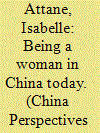

|
|
|
|
|
| Publication |
2012.
|
| Summary/Abstract |
The aim of this article is on the one hand, to draw up a socio-demographic inventory of the situation of Chinese women in the prevailing early twenty-first century context of demographic, economic, and social transition, and on the other hand, to draw attention to the paradoxical effects of these transitions whilst taking into account the diversity of the realities women are experiencing. In conclusion, it raises the possibility of changes in gender relationships in China, where there are, and will continue to be, fewer women than men, particularly in adulthood.
|
|
|
|
|
|
|
|
|
|
|
|
|
|
|
|
| 2 |
ID:
116545
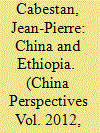

|
|
|
|
|
| Publication |
2012.
|
| Summary/Abstract |
Since 1995, China and Ethiopia have gradually forged close relations. On both sides, the establishment of this partnership was motivated as much by diplomatic, strategic, and even ideological considerations as by economic ones. For Beijing, economic and trade cooperation with Addis Ababa is a means rather than an end in itself. For Ethiopia, however, partnership with China mainly serves the internal political and economic purposes of the regime that has been in place since 1991, under Prime Minister Meles Zenawi for 20 years and, since his death in August 2012, under his successor Hailemariam Desalegn. The relationship is characteristic of the special but asymmetrical links Beijing has sought to establish with countries of the South that are strategically important but economically backward. It also illustrates the attraction the "Chinese model" of development holds in Africa and elsewhere.
|
|
|
|
|
|
|
|
|
|
|
|
|
|
|
|
| 3 |
ID:
116541
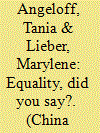

|
|
|
|
|
| Publication |
2012.
|
| Summary/Abstract |
After 30 years of economic reforms, what is the comparative situation of men and women in the People's Republic of China? How can we analyse the policies for promoting gender equality? Have inequalities that existed in Mao's China disappeared now? Or have factors such as the liberalisation of the labour market and the single child policy merely shifted the boundaries of such inequalities and even created others? This article looks at the ways in which the equality issue is dealt with, both by the government and by the All China Women's Federation and feminist organisations. It seeks to show which inequalities are prioritised and what has been the state's place in contemporary Chinese feminism.
|
|
|
|
|
|
|
|
|
|
|
|
|
|
|
|
| 4 |
ID:
116542
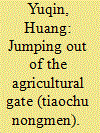

|
|
|
|
|
| Publication |
2012.
|
| Summary/Abstract |
Since the late 1950s, the implementation of the household registration (hukou) system has made converting rural hukou to urban status a central aspect of upward social mobility in rural China. Through a biographical approach, this article attempts to capture, in relation to historical periods between 1950 and 2012, the ups and downs of various forms of hukou conversion and social mobility channels, how these fluctuating routes have been perceived, interpreted, pursued, and actualised by the rural people in a central Chinese village, and their consequences in terms of gendered household educational resources distribution among children. By doing this, it addresses ongoing debates about the relationship between allocation of household resources, gender inequality, and social mobility in rural China. While examining the dynamics of these avenues to social mobility, this paper pays particular attention to education and its changing function as an important social mobility channel, and argues that there is an unintended link between higher educational attainment, improvements in gender equality in education in rural China, and social mobility. This link is nevertheless weak due to its logic of developmentalism.
|
|
|
|
|
|
|
|
|
|
|
|
|
|
|
|
| 5 |
ID:
116546
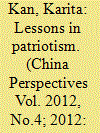

|
|
|
| 6 |
ID:
116544
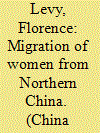

|
|
|
|
|
| Publication |
2012.
|
| Summary/Abstract |
Since the late 1990s, a little-known wave of Chinese migrants has been making its way to France. Coming from regions with no tradition of international mobility, it differs from classic migratory flows in that it consists mainly of urban middle-class women in their forties who are affected by the reform policy. Drawing on the point of view of these female migrants regarding developments in the job market, their economic resources, and changes in family relations, this article examines the transformations in social norms and gender roles that affected these people before their departure. It considers whether these developments have had an impact beyond China's borders, and whether they may have influenced the gender configuration of this migratory flow making its way to Europe.
|
|
|
|
|
|
|
|
|
|
|
|
|
|
|
|
| 7 |
ID:
116547


|
|
|
| 8 |
ID:
116548


|
|
|
| 9 |
ID:
116543
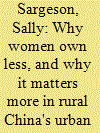

|
|
|
|
|
| Publication |
2012.
|
| Summary/Abstract |
As the amount of wealth in China's economy grows, so too does the size of the gender asset gap. Nowhere is this gap more extreme, or its consequences for women's future wealth, subjectivity, and agency more serious, than in peri-urban sites where the conversion of farmland for development has sent property values skyrocketing. This article explores how the gender asset gap is being reproduced in the course of rural China's urban transformation. It queries the plausibility of the most common explanations for this gap, and suggests that Charles Tilly's theory of categorical sources of "durable inequality" offers a useful corrective to those explanations. Drawing on data collected from interviewees and survey respondents in Zhejiang, Fujian, Hunan, and Yunnan provinces between 2004 and 2012 and from secondary sources, the paper illustrates how, when villagers are compensated for the expropriation of their land and demolition of their agricultural and business activities and housing, Village Committees, patrilineal households, and local government authorities utilise gender categories to resolve distributional problems and differentially compensate men. Women become less likely than men to be acknowledged as, and have the capacity to fully act as, the owners, managers, and users of the assets whose value increases as a result of urbanisation.
|
|
|
|
|
|
|
|
|
|
|
|
|
|
|
|
|
|
|
|
|